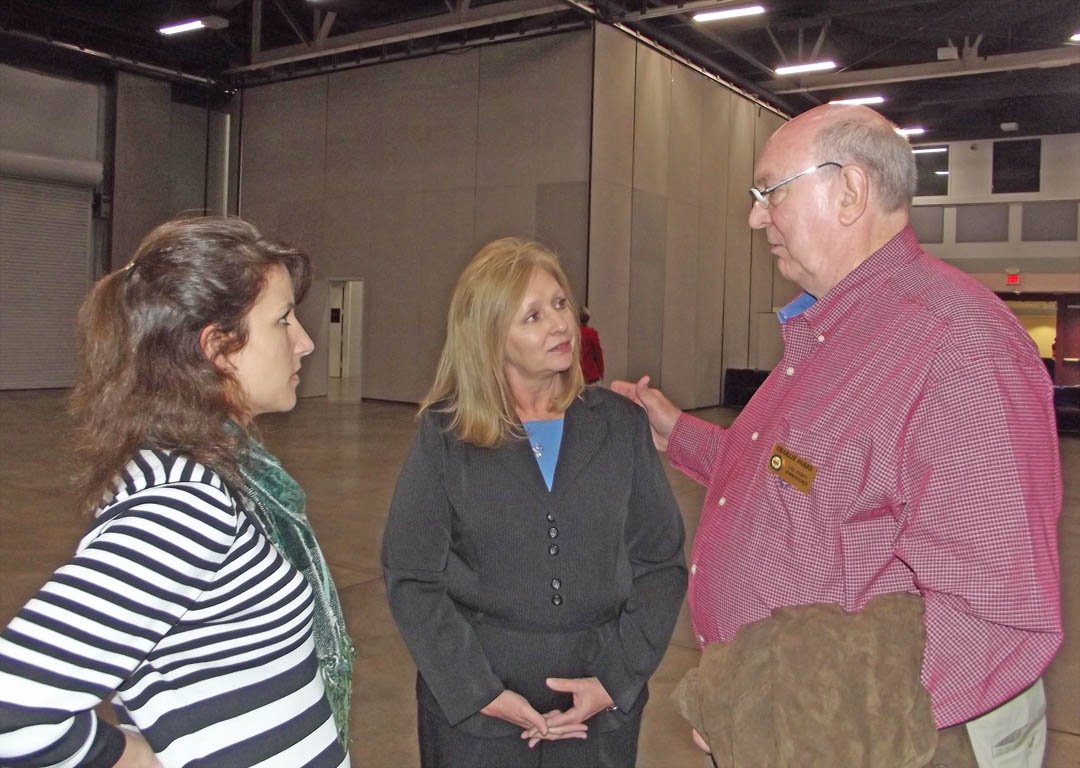
College News
CCCC partners with community to enhance work force
03.04.2013 • College & Community, College General, Continuing Education
SANFORD - Members of the Central Carolina Community College Human Resources Development program (HRD) and North Carolina Career Readiness Certificate program (CRC) met with representatives from the Lee County business and civic communities on Feb. 28 at the Dennis Wicker Civic Center. The purpose of the meeting was to discuss how to better serve Lee County job seekers and businesses through a mutually beneficial partnership.
"We asked you to come this morning because we want to partner with you to help our residents succeed," said Phyllis Huff, dean of Continuing Education at CCCC. "Our clients aren't just people in transition, the unemployed and the under-employed, they are also all of the agencies represented here. Companies are hiring, and we want you to see how HRD/CRC can assist you in reaching your goals."
Established in 2007, the Career Readiness Certificate program at CCCC provides existing employees and potential job candidates with a credential that validates their skill levels to enhance employability.
The program prepares job seekers for the demands of the work place by strengthening basic skills such as reading and applied mathematics. The curriculum is based on the established WorkKeys assessment tests, a comprehensive skills assessment tool recognized by thousands of companies nationwide and by state and federal agencies.
The Human Resources Development program at CCCC educates and trains adults through the development of the essential skills needed to secure and maintain employment in the workplace. Individuals who do not initially achieve the
Career Readiness Certificate can still pursue target training and education through the HRD program.
"We have a range of resources we can bring to the table to help your business succeed," said Dr. Pam Senegal, CCCC vice president for Economic and Community Development, "some of these resources include profiling a position that you're having trouble filling and training your employees in new technologies."
CRC Coordinator Patricia Stone-Hackett said the purpose of CRC is to build a higher performance, highly credentialed work force.
"This certificate is to serve as a nationally recognized credential focusing on job analysis, assessment and training, that will appeal to employers everywhere," she said.
As CRC Coordinator, Stone-Hackett also visits work sites to assess company needs in the areas of communication, problem solving, and personal and interpersonal skills.
"I'm there to determine how employers can reduce their time and labor costs as well as help individuals become more effective employees," said Stone-Hackett.
Tammy Haines, of Belcan Temporary Staffing Solutions, said Central Carolina Community College came to her aid when she needed it.
"I have lived in small towns all of my life, but no community college has ever said, 'We want to be your partner,'" she said.
Haines explained how her association with HRD/CRC helped improve the performance of equipment operators for a major company.
"Some of the candidates couldn't even turn on a computer to take the test when they first came to me," she said. "Our testing success rate was approximately 30-35 percent then. With the help of the HRD/CRC program, that rate has increased to about 80 percent."
Judy Miller, a graduate of the HRD/CRC program, had not worked in six years when her family moved from Georgia to the Sanford area.
"One of the most helpful resources as I began to job search was the Skills for Success class CCCC offered," Miller said. "I think the overarching skills and principles taught in the course helped me brush up on my skills and prepare me for the work force. There is a whole package to making a positive impression on employers. That is what CCCC gave me."
Other speakers and attendees, included Lee County HRD coordinator and instructor for CCCC Crystal McIver, Angela Tomlinson of the Lee County Job Link Career Center, Shirley Rijkse of Lee County Industries, Fredricka Cook of Family Promise, CCCC-Harnett County HRD coordinator and instructor Nicole Brown, Bob Joyce, president of the Sanford Area Chamber of Commerce, and Lee County Commissioner Charlie Parks.
"What I'm hearing here," Parks said at the meeting, "is the strength of dedication you have and the opportunities you're giving people to be successful in the work force. We still have 12 percent unemployment in Lee County, but every day Central Carolina is working to help us reach our goal of full employment. We as business owners and representatives need to get the word out about this wonderful resource and opportunity at Central Carolina."
For information on the HRD program at Central Carolina, contact Patricia Stone-Hackett at (919) 777-7716 or pstone-hackett@cccc.edu. For information on the CRC program, contact Crystal McIver at 919-777-7798 or cmciver@cccc.edu.

Meg Moss (left), executive director of Lee County Industries, and Sheryl Smith, of the N.C. Division of Work Force Solutions, speak with Charlie Parks, chair of the Lee County Board of Commissioners, following the Feb. 28 Central Carolina Community College information conference for Lee County business and civic leaders at the Dennis A. Wicker Civic Center. Members of the college’s Human Resources Development and N.C. Career Readiness Certificate programs spoke with community representatives about how to better serve Lee County job seekers and businesses through a mutually beneficial partnership. For information on the HRD program at Central Carolina, contact Patricia Stone-Hackett at (919) 777-7716 or pstone-hackett@cccc.edu. For information on the CRC program, contact Crystal McIver at 919-777-7798 or cmciver@cccc.edu.
- Central Carolina Community College
- Serving Chatham, Harnett, & Lee Counties, NC
- 1-800-682-8353

